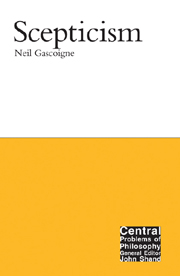2 - The legacy of Socrates
Summary
Introduction
Hitherto we have encountered scepticism as presenting epistemologists with a certain theoretical problem; namely, to show that our empirical beliefs are held on rational grounds by demonstrating that the distinction between being justified in believing that q and merely assuming that q is legitimate. Although the sceptic who uses philosophical arguments to generate doubt about our practices of justification was contrasted with the pk-sceptic who challenges the possibility of philosophical knowledge, the latter too was seen as posing a theoretical obstacle, in the form of the radical version of the Agrippan argument with which we concluded Chapter 1. In both cases, then, scepticism was associated with theoretical attitude doubt.
This theoretical picture of pk-scepticism and the threat of the Agrippan argument differs from the one that emerges when one looks at the Ancient Sceptics. Like their traditional foes the Dogmatists, these were concerned with the role that philosophy has to play in determining how human beings should live their lives. Principally, the Sceptic's view was that rather than guide us in the search for the knowledge that would enable us to live happy lives, philosophy should cure us of the disposition to believe that there is any such knowledge. Inspired by the legacy of that most enigmatic of figures, Socrates (c. 469-c. 399 bce), they attempted to make sense of his seemingly paradoxical claim that the one thing he knew was that he knew nothing.
- Type
- Chapter
- Information
- Scepticism , pp. 31 - 67Publisher: Acumen PublishingPrint publication year: 2002

